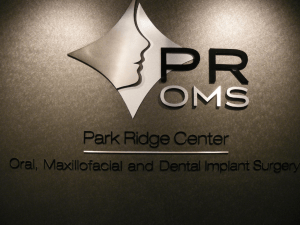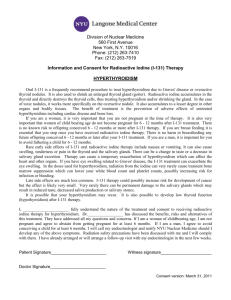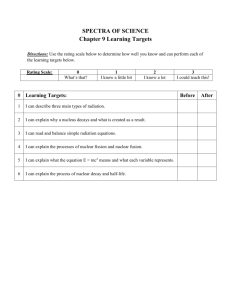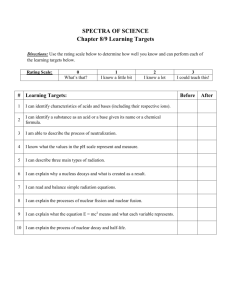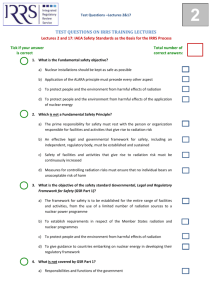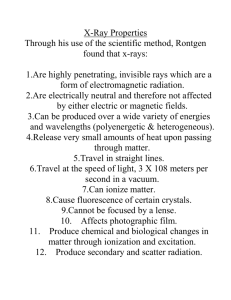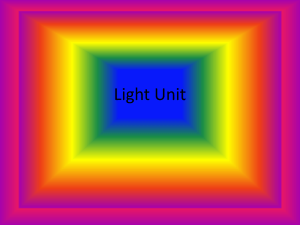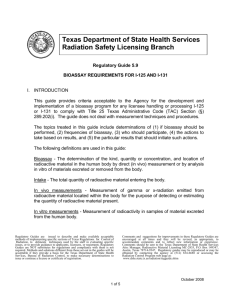NUCLEAR MEDICINE/ENDOCRINOLOGY/ENDOCRINE SURGERY
advertisement
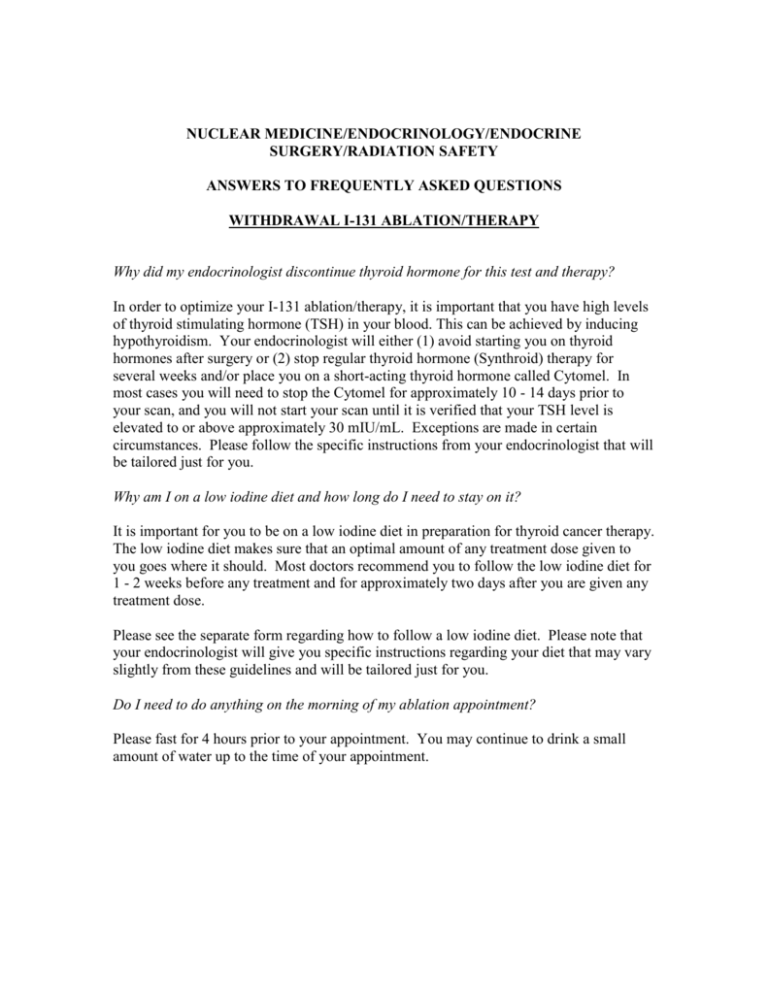
NUCLEAR MEDICINE/ENDOCRINOLOGY/ENDOCRINE SURGERY/RADIATION SAFETY ANSWERS TO FREQUENTLY ASKED QUESTIONS WITHDRAWAL I-131 ABLATION/THERAPY Why did my endocrinologist discontinue thyroid hormone for this test and therapy? In order to optimize your I-131 ablation/therapy, it is important that you have high levels of thyroid stimulating hormone (TSH) in your blood. This can be achieved by inducing hypothyroidism. Your endocrinologist will either (1) avoid starting you on thyroid hormones after surgery or (2) stop regular thyroid hormone (Synthroid) therapy for several weeks and/or place you on a short-acting thyroid hormone called Cytomel. In most cases you will need to stop the Cytomel for approximately 10 - 14 days prior to your scan, and you will not start your scan until it is verified that your TSH level is elevated to or above approximately 30 mIU/mL. Exceptions are made in certain circumstances. Please follow the specific instructions from your endocrinologist that will be tailored just for you. Why am I on a low iodine diet and how long do I need to stay on it? It is important for you to be on a low iodine diet in preparation for thyroid cancer therapy. The low iodine diet makes sure that an optimal amount of any treatment dose given to you goes where it should. Most doctors recommend you to follow the low iodine diet for 1 - 2 weeks before any treatment and for approximately two days after you are given any treatment dose. Please see the separate form regarding how to follow a low iodine diet. Please note that your endocrinologist will give you specific instructions regarding your diet that may vary slightly from these guidelines and will be tailored just for you. Do I need to do anything on the morning of my ablation appointment? Please fast for 4 hours prior to your appointment. You may continue to drink a small amount of water up to the time of your appointment. What are the benefits and the risks/side-effects of my I-131 ablation/therapy? The nuclear medicine physician and endocrinologist will discuss in detail with you the benefits and risks of therapy. This information will be provided to you in a separate treatment consent document. The purpose of this sheet you are reading is to provide you with basic instructions and answers to common questions. The consent document covers benefits, risks and side-effects in detail, and the finer points are best discussed with your doctors in person. My endocrinologist and the nuclear medicine physician have determined that I must be treated in the hospital instead of going directly home. How many days will I be in the hospital? If you are treated as an inpatient, the amount of radioactivity emitted from your body will be measured every day until it drops to levels that are safe enough for you to go home. The Radiation Safety Office (i.e., a Medical Physicist) from the Dept. of Radiation Safety will determine when it is safe for you to return home, depending on your living circumstances and work situation. Most patients are in the hospital for 1 to 2 days. Occasionally, an individual must stay for 3 to 4 days. I am going to be treated with radioiodine as an inpatient. Can I bring my laptop, cellphone, and books with me to the hospital? You can bring a laptop or other personal electronics. You will keep them in your room at your own risk as the hospital cannot monitor your personal electronics. The Radiation Safety Office personnel will wrap plastic wrap around your personal electronics and prior to sending you home they will remove the plastic wrap. There is a very rare chance that contamination of your personal electronics could occur which would require you to leave them with the Radiation Safety Officers until they are deemed safe. Books, magazines and other reading material cannot be protected with plastic wrap and cannot be decontaminated. Any contaminated paper reading material will have to be discarded – you will not be able to bring it home. I have just been treated with radioiodine. What instructions must I follow and for how long? Drink 6 – 8 glasses of extra fluids per day for the first 3 days (as long as you are not on fluid restrictions for heart or kidney disease). These instructions will ensure adequate salivary flow and hydration of the oral cavity which will help wash the iodine out of your salivary glands and will minimize the risk of inflammation of the salivary glands. At the end of 3 days, continue to drink several extra glasses of liquid for a total of one week after your treatment. Use separate plates and utensils for a total of 7 days. They can be either paper plates and plastic utensils or you may use your own set of utensils, plates, cups, etc. Disposables should be rinsed and then placed in the garbage. Non-disposables should be thoroughly washed, preferably in a dishwasher. If possible use a separate bathroom for one week. If this is not possible, be very careful to avoid contaminating the toilet surfaces with urine. Flush the toilet twice each time you use it. Be careful to avoid getting saliva on surfaces in the bathroom as the radioiodine is present in the saliva. Keep your towels, toothbrush, etc. separate from those of other people in your household. At the end of one week wash all clothing and towels in a washing machine. Avoid preparing food for others whenever possible. If you must prepare food for others, wear plastic gloves and touch nothing with your bare hands and do not taste food or do anything that could get your saliva on any food that others may eat. You must not sneeze or cough when preparing food for others as this could contaminate it. Whenever possible use a separate telephone headset for one week and clean it at the end of the week. This will remove trace amounts of radioiodine that could transfer from your mouth to the phone. Breastfeeding of any infants must be discontinued. All women must avoid pregnancy. Authorities advise not getting pregnant for 6 – 12 months. The risks related to pregnancy/fatherhood are discussed in more detail in the consent documentation. Please discuss this issue with your doctor. Sleep in a separate bed for one week. You must avoid sleeping near any wall that may have a bedroom on the other side where others may be sleeping. Radiation can pass easily through standard walls. Whenever possible avoid pregnant women and children for one week. It is OK to briefly pass by such individuals in a store or on the street, but you should avoid spending more than a few minutes around such individuals for a week. If you would like to be around adults, make sure you stay at least 3 feet away for periods up to 8 hours, and 6 feet for longer periods. You should plan no long car/bus or train trips for one week. If you take a car/taxi home, sit in the back seat diagonally opposite the driver. I have just received my ablation/therapy dose of I-131. Do I need to be concerned about radiation exposure to my pets? There are no specific guidelines regarding radiation precautions for pets after an ablation/therapy dose. In order to minimize your pet's exposure to radioiodine, it is reasonable to avoid having your pet lick your face or share any food you may have touched for at least 3 - 4 days, just to avoid the chance of them ingesting any radioiodine that is released in your saliva. It is reasonable to prevent your pet from sleeping close to you for 3 - 4 days. Playing with your pets for brief periods of time will not expose them to significant radiation. Now that I have received my radioiodine therapy, when can I start taking thyroid hormone? Your endocrinologist is responsible for instructing you on when to start taking thyroid hormone. Generally this is 2 – 3 days after your therapy dose, but instructions may vary depending on your situation and you should talk to your endocrinologist about this as the nuclear medicine physicians do not prescribe thyroid hormone. When can I return to work? The answer to this question depends on the type of work that you do and how close you are to other people at work. If you are around others (especially pregnant women and children) you may be asked to stay out of work for up to one week. The nuclear medicine physician and radiation safety officer will evaluate your situation and tell you when it is OK to return to work. Why must I return for a scan one week after my treatment? A post-treatment scan is an effective way to check for any deposits of thyroid cancer that may exist in your body. Therefore, all patients are asked to return at one week for a whole body scan (takes about an hour). This information will be important for your subsequent care. If there is a lot of bowel activity or there are blurry spots on your images, the nuclear medicine doctor will speak to you and you may be asked to return for another scan at 8 or 9 days. You may be asked to cleanse your bowel or thoroughly wash your hair before these scans. The scan may consist of a whole body scan or perhaps a special 3D scan called a SPECT/CT. This should not be a cause for alarm – most of the time the repeat scan confirms that “blurry” or uncertain findings are normal. Only very rarely are additional abnormalities found. When you arrive for your post-treatment scan, be sure to let us know if you think you are having any side effects from the therapy you received. The instructions in this paperwork are different from the instructions given to me by my endocrinologist or the nuclear medicine physician. What do I do? This document is a general guideline. Your doctors may customize instructions for you based on your individual situation. In general, the nuclear medicine physicians will give you instructions regarding radiation precautions and endocrinologists will guide you regarding the low iodine diet, when to start or stop medications, and other instructions related to blood testing and follow-up. If you have any questions, please call the Tisch Hospital Nuclear Medicine Department at 212 263 7410 and ask to speak to a doctor. Also discuss these matters with your endocrinologist. DO NOT HESITATE TO CONTACT US IF YOU HAVE ANY QUESTIONS OR CONCERNS. WE ARE HERE TO HELP YOU! Revision: October 30th, 2011 DRAFT Approved by: DRAFT

